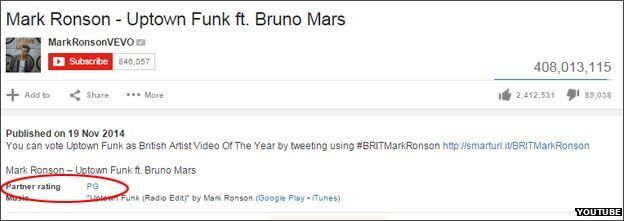Research
Music Video Age Rating
Age restrictions have been put into place on YouTube and Vevo by the government as most parents are concerned about what their children are watching on those platforms, especially how some artists including Miley Cyrus, Robin Thicke and Rihanna are releasing unsuitable content which can be very explicit to a younger audience.
Only 20% of Music Videos were getting a 12, 15, or 18 certificate. Although labels didn't not find it necessary to give in music that they felt wouldn't of needed a rating.
Amidst the songs deemed to require certification was Love Me Like You Do (Ellie Goulding) which is from the soundtrack to Fifty Shades of Grey. The video had contained several excerpts from the erotic thriller, it was rated 15 by the BBFC for "strong sex references".
Other Music Videos included:
- Kasabian - Stevie Released last October, the unsettling video for Stevie showed a young boy being raised as a test subject in a laboratory. It received a 12 certificate for "moderate threat".
- Dizzee Rascal - Couple of Stacks The video for Dizzee Rascal's last single was graphic enough to earn an 18 rating. The BBFC cited the video's "strong bloody violence, gore [and] very strong language" in its ruling.
- Prides - I Should Know You Better Shot in Scotland, the video for Prides' synthpop single featured a "weird and sad tale of a nice yeti just trying to get along in life" until a hunter cuts his life short. It was rated 12 for "moderate threat, violence and sexual images."
At the moment, there is no rule on how the guidance should be displayed.
This is YouTube's current format is to list the information in plain text under the video.
It came after parents and musicians spoke out about the content of music videos.
Pop star Annie Lennox was among those who called the imagery of certain videos "dark" and "pornographic".
"I'm all for freedom of expression," she told the BBC, "but this is clearly one step beyond, and it's clearly into the realm of porn."
As the trial scheme goes public, David Austin, assistant director of the BBFC said: "We hope this pilot will provide consumers with information to help guide them and their families when accessing music videos online.
"Parents taking part in our most recent review of the BBFC Classification Guidelines in 2013, expressed their concerns about the content of music videos online, in particular their role in the sexualizations' of girls and portrayals of self-harm, drug use and violence in some music video content."
70% of parents of under 12s are concerned about their children being exposed to inappropriate content in music videos

You won't see a black card with an age stamp like you do at the cinema or the start of a DVD, however Vevo and YouTube will display this information on the webpage.
"Britain is a world leader in making exciting and original music, in part because our artists have a freedom to express themselves that we rightly cherish," said Geoff Taylor, chief executive of the British Phonographic Industry.

Comments
Post a Comment